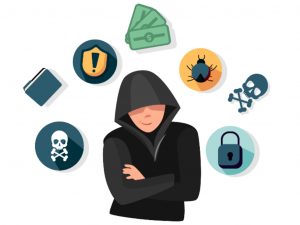Punishment For Internet Fraud in Nigeria: The usage of online software and services with internet access to scam or exploit victims. Data breaches, phishing, as well as other hacking actions targeted at deceiving persons are all examples of “online fraud.” Internet frauds that target victims using online services are responsible for millions of dollars in fraudulent activity each year. The figures will keep rising as online activity grows and cyber-criminal tactics become much more sophisticated. When it comes to online fraud, there are both state and federal regulations that apply.
Cyber thieves use a variety of attack routes and strategies to commit internet fraud. Malicious software, email and fake websites used to steal user data, and complex, far-reaching phishing scams are just a few examples. Internet fraud encompasses a wide range of attacks, including:
1. Phishing and spoofing: Using email and online chat services to trick people into giving personal information, login passwords, and financial information.
2. Data breach: Taking confidential, protected, or sensitive information from a secure area and transferring it to an untrustworthy location. This contains information taken from users and businesses.
3. Denial of service (DoS): Disrupting traffic to an online service, system, or network to cause harm.
4. Malware: Malicious software that is used to harm or disable users’ devices, as well as steal personal and sensitive data.
5. Ransomware: Malware that prohibits users from accessing important data and then demands payment in exchange for access to be restored. Phishing assaults are the most common way for ransomware to spread.
6. Business email compromise (BEC): A sophisticated type of assault aimed at companies that conduct a lot of wire transfers. It uses social engineering techniques to get access to legitimate email accounts to make unlawful payments. Users must grasp basic forms of internet fraud and methods to avoid hacker efforts at internet fraud.
Punishment for internet fraud in Nigeria
Nigerians have evolved into cyber-creatures who spend a lot of time online. In Nigeria, as the digital world grows, so does cybercrime. Nigeria’s Cyber Laws arose from the need to combat these seemingly uncontrollable events. Cyberlaw acts as a barrier to cybercrime, preventing it from taking place. To prevent illegal online activities, the government is dedicated to adopting and implementing legislation.
In Nigeria, this “Cybercrimes (Prohibition & Prevention) Act, 2015” has quite a major impact on cyber law. This Act establishes in Nigeria a detailed legal, regulatory, and institutional structure for the prevention, detection, prosecution, and punishment of cybercrime. In addition, the Act promotes cybersecurity and the safeguarding of computers and networks, electronic communications, data and storage programs, confidential information, and privacy rights, and the safeguarding of critical national information infrastructure. This Act’s provisions apply across the Federal Republic of Nigeria.
Cybercriminals are subject to several offenses and punishments under the cybercrime statute. Let’s look at it more closely.

Recommended: Punishment for stealing in Nigeria
Punishment Unauthorized or illegal computer access
a. Anyone who, without authorization, accesses, wholly or partially a computer network or system for fraudulent bases and gets material that is crucial to national or individual security commits a crime punishable by up to 5 years in imprisonment or a fine of up to N5,000,000.00, or both.
b. If the activities described in paragraph
(1) of this section are committed with the goal of collecting computer data, gaining access to any program, getting business or industrial secrets, or obtaining protected data, the penalty is imprisonment. for not more than seven years, or payment of not more than N7, 000,000.00, or both such fine and imprisonment.
c. Anyone who utilizes any device to remain undetected or somehow hinder identification or validation with the act or an omission with the purpose to commit an offense under this section commits a crime and faces a punishment of not more than seven years in jail or a fine of not more than on punishment. a fine of N7,000,000.00 or perhaps both a fine and imprisonment.
d. Any person or entity that willfully trafficks in passwords or basic information that allows a computer to be hacked without formal standing in or out of Nigeria commits the crime and is punishable by a fine of not more than N7, 000,000.00 or a prison term of over three years or even both if the same exploitation affects the public, corporate, or individual best interests in or out of Nigeria.

Also see: Highest Paying Companies in Nigeria
Punishment for System interference
Any individual who, without lawful authority, deliberately or for illegitimate purposes, performs an act that direct or indirect obstructs the operation of a computer computer system by inputting, forwarding, deleting, negatively impacting, altering computer data, or any other type of interference with the computer system, which inhibits the computer system or any part thereof from working effectively.

Comics a crime and will be imprisoned for more than two years or pay a fine of over two million nairas or both fine and imprisonment.
Punishment Punishment Computer-related forgery
a. A person who intentionally accesses any computer or network as well as inputs, edits, deletes, or disables any data arising in inauthentic data with the aim that such fake data will be considered as if it were genuine is guilty of computer related forgery.
Regardless of whether or not the material is directly legible or understandable commits a crime and is guilty on conviction to a prison sentence for a term of not less than three years or to a fine of over N7,000,000.00 or both.
b. Any individual who, with the intent to defraud, falsifies computers and other digital payment devices with the intent not to pay an individual commits an offense and faces a maximum sentence of seven years in prison and forfeiture of the proprietary interest in the stolen money or property to the bank.

Recommended: Advantages and Disadvantages of Corporal Punishment
Punishment for Offenses against the nation’s crucial information infrastructure
a. If convicted, any person who, by purpose, commits any crime punishable under this Act against any essential national information systems defined under section 3 of the Act faces a term of not over ten years in prison even without the possibility of a fine.
b. If convicted, the perpetrator faces a full sentence of 15 years of imprisonment without the option of a fine if a person is suffering significant bodily damage as a result of an infraction within paragraph (1) of this section.
c. The offender receives a life sentence if guilty of an offense under paragraph (1) of this section that led to the death of a person.
Internet fraud is a major crime. A criminal convicted of these offenses may receive a hefty prison sentence. Many of the individuals accused of running a Nigerian internet fraud face multiple charges, which implies they will face different penalties for each offense.
In conjunction with imprisonment time and financial fines, people accused of internet scams may be labeled criminals in civil trials and forced to repay the money they stole. The cost of a civil action or court-ordered restitution can be substantial, with some criminals being obliged to pay large sums of money.

Recommended: Differences Between Military and Democratic Rule
Conclusion
A legal framework for dealing with Internet frauds/ cybercrime is known as cyber law. Because of the rising usage of E-commerce, appropriate regulatory processes must be in place to prevent fraud. Cybersecurity regulations differ greatly from one country to the next and from one jurisdiction to the next. Penalties range from a fine to jail, depending on the nature of the offense. Citizens must grasp their own countries’ cyber laws to be completely educated about any cybersecurity issues.

Edeh Samuel Chukwuemeka, ACMC, is a lawyer and a certified mediator/conciliator in Nigeria. He is also a developer with knowledge in various programming languages. Samuel is determined to leverage his skills in technology, SEO, and legal practice to revolutionize the legal profession worldwide by creating web and mobile applications that simplify legal research. Sam is also passionate about educating and providing valuable information to people.